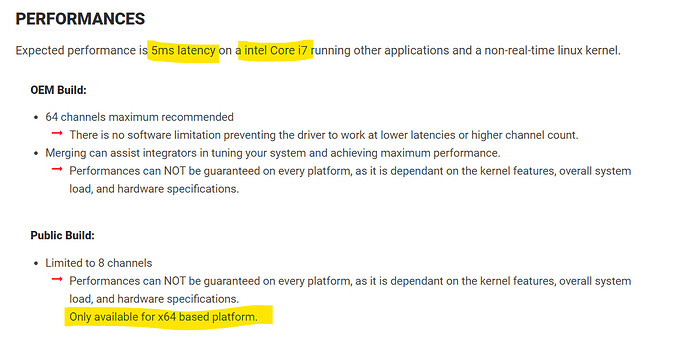Just wondering to what extent RAAT incorporates AES67 where Audio over IP is concerned?
Not at all.
According to Wikipedia:
Audio Specifications
Maximum sampling rate 96 kHz
Maximum bit depth 24 bits
Which wouldn’t make many people here happy. And that with a development date of September 2013.
Is this answer still valid ?
Some guy over at CA says Roon will work with the Dante Virtual Sound Card.
So even though we’re not talking Roon endpoints, equipment like active speakers will work.
Yes, still correct. RAAT does not incorporate any AES67 technology and Roon has no explicit AES67 support built in.
Roon can interoperate with some AES67 devices via ASIO/CoreAudio drivers that re-broadcast the audio over the network using AES67. This is likely how the guy on CA is doing it, and is also how Merging’s drivers work for their RAVENNA devices. This is a separate topic from the original question, though.
Hi Brian,
I am curious if roon incorporates any benefits of audio over IP, even if it doesn’t adopt AES67. In other words, does roon include any of the benefits of ethernet protocols used in pro audio?
If not, why not?
I imagine pro audio such as live and recording venues use ethernet extensively and somehow manage to produce very high sound quality. However in domestic hifi, sound quality can be improved with specialised switches, isolators and cables (and power supplies) but at considerable expense. What can software like roon do help achieve excellent sound quality with less expenditure on hardware?
Can pro audio approaches be modified, mimicked and scaled for domestic hifi systems?
Thanks
Is there either a way to connect roon to a Ravenna / AES67 device (Ex. Merging Anubis) from ROCK?
Or is there a way to convert the RAAT protocol to Ravenna?
Do any of you know if RAAT is open-source and documented?
Thank you
MERGING+PLAYER is a MERGING+NADAC with built-in NUC and ROCK, including support for AES67 implemented by MERGING. This is the only way how you can get what you asked for and that I’m aware of.
ROCK is distributes as is and doesn’t allow a user access (to install an additional driver for example). RAAT is developed and owned by Roon Labs.
None of this hasn’t been already asked in the past. See also:
But I have no clue if this driver for Linux is available, open-source and still maintained/working.
You can run a Merging virtual soundcard on either a PC or Mac and stream to that on Roon if you also have either Roon or RoonBridge installed on the PC/Mac.
You’ll need to use the Aneman utility to create Ravenna connections between your Anubis and the virtual sound card.
I stream from my ROCK to my Merging Hapi in this way.
Thank you Joel for your reply.
But that would imply having a 2nd computer running the virtual sound card.
I was looking for the possibility of having the virtual soundboard mounted directly on rock which is running Linux.
Merging has drivers for Linux I believe but haven’t figured out how to do it.
My idea would be to run as ssh tunnel to the ROCK OS and install the virtual card and map everything there.
Is it possible?
ROCK is a package installer for RoonOS and Roon Server, the OS is bespoke and whilst it has some Linux roots it is not Linux. It’s a custom minimalistic OS that only runs Roon, it is locked down and affords no user customisation.
If you want a one box solution you’d have to forgo ROCK.
Hi
Was looking into this and was thinking that maybe I could use a Raspberry Pi just to act as “bridge” between Roon Rock and my Anubis.
I have PC but these are used specifically as DAWs and are not running 24/7.
Bur probably a raspberry Pi running the virtual sound card could do the trick.
Do you know if it would have enough computing power for this task (would be the only task of that Raspberry Pi).
Still need to figure how to make it work…
What are your thoughts?
Thank you
Anyone has any thoughts on my last post?
Thank you
Not using any of this stuff myself but checked due to curiosity, and you linked to the page with a link to concise instructions yourself - should be rather trivial.
RPi4 should effortlessly handle this task, imo.
ooops
![]()
Thanks for correcting me, Stephen - how could I overlook this vital piece of info?
![]()
Hi, did you do it? @Chunhao_Lee was the pioneer of getting Ravenna ALSA driver work (outside of the dev at Merging). And I was next, thanks to his tips.
So I also got it working on Ubuntu. It is best to have an Intel NIC which RPi4 does not have.

